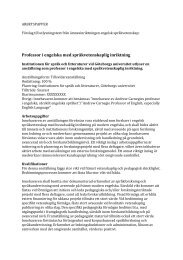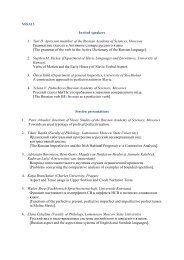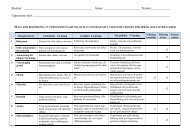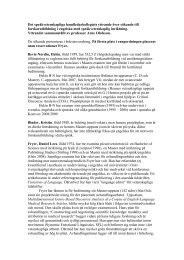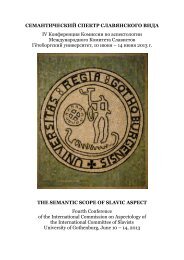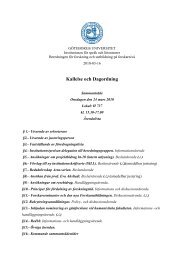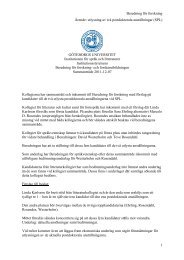nomenon. However, until long into the 20 th century, it was a luxury just for few chosen elites andout of reach of the majority of people to move in between languages and cultures. Situation hasdrastically changed during the last decades. The change calls for coining a new term ‘transculturality’;firstly, to conceptualize the new conception of culture, which is more heterogeneous andegalitarian, and not enclosed by a national border and determined by a nation’s political or ethnicpower relationship, and secondly, to elucidate the increased accessibility of various culturesand cultural artifacts, greatly due to the advance of electronic media and transportation system(at least in the industrialized part of the world). This changed cultural performance is thoughtto have changed the individual’s subjectivity, which will be discussed later. This changed state ofaffairs merits to be made expressively visible by the term transculturality in contrast to the previousmulticulturality.Transcultural fandomSusan Napier scrutinized a new attitude towards cultural product taking anime as example. 13Note that anime as genre is regarded belonging to ‘subculture’. About anime, she writes that itoffers an extremely heterogeneous kind of cultural self-representation, which is in fact oneof its attractions. The “transformation and change” that the medium foreground resists any attemptat narrow cultural categorization. As a result, the Japanese national cultural identity putforward by anime is increasingly, and perhaps paradoxically, a global one. In this regard anime isperhaps the ideal aesthetic product for the contemporary period, at the forefront of creating analternative cultural discourse that goes beyond the traditional categories of “native” or “international”to participate in what may well be a genuinely new form of global culture.” (236)Accordingly to Napier, the origin of anime is not an important marker for those who watch. Shealso stresses the “distinctive properties” of the medium itself, which transgresses the border ofthe real and the fantastic, in her word its “hyperreal” nature. As such, anime positions itself asa newcomer (the Other in Napier’s word) in the field of action or fantastic films. This othernessitself is an important factor for anime fans more than its national origin. (236) General attitudeamong anime fans, which her questionnaire survey showed is,(A)nime fans are engaged in a relatively new form of spectatorship, that of the committedmedia fan. The fan’s interacting with the cultural object is deeply engaged, transcending issues ofnational boundaries, content, style, or ideology, and it cannot be subsumed under any one-notedescription. (242)According to Napier, a new kind of spectatorship has been shaped and successively shapingtoday in a transcultural space; transcultural, in the sense that anime as a cultural product movesglobally, but its otherness is not excessively bound to national or ethnic identity, Japanese.Rather than the product’s national origin, more important is the mediums position in the fieldof cultural production itself, namely its otherness or marginal position. Spectators create a personal,individual bond to a cultural product without attaching much importance to its national orethnic otherness.Hills is critical of those, including Napier, who stresses on transculturality in the reception of13 Napier 2005. Anime from Akira to Princess Mononoke: Experiencing contempoerary Japanese animation.New York: Palgrave Macmillan.Literature and Transculturality5
popular culture like anime, reminding a considerable symbolic power of national origin. 14 However,having warned against downgrading the significance of national origin, Hills writes aboutfandom,US/UK use of the term “otaku” acknowledges that fandom is hegemonically devalued both inJapan and ‘the West’. The Japanese fan is therefore linked to the non-Japanese fan: fan identityis prioritised over national identity. This identification can be read as an attempt to ‘naturalise’fan identities by implying that fandom is an essentially transnational/transcultural experience. 15(Quotation according to the original without any change)His argument is somewhat hesitant regarding the position of the spectatorship; on the onehand, admitting the emergence of a new ‘transcultural’ spectatorship in a global cultural scene,but on the other hand, reminding the existence of the spectatorship that is enhanced by the‘imagined’, stereotype conception of the Other, and for whom the imagined Other carries a significance.Conclusively, however, he seems admitting transculturality in fandom of anime, statingthat,<strong>Cultural</strong> and national contexts are one version of “academically prescribed categories”, asare categories of “appropriation” and “globalisation”. The case of anime suggests that we needto refuse these terms, or at the very least supplement them by recognising that subculturalhomologies (the way subcultures use certain texts to articulate their group identity) can becometranscultural homologies (subcultures can use representations of other national subcultures toarticulate a shared identity or devaluation). (ibid.) (Quotation according to the original withoutany change)Both Napier and Hills highlighted the changed transcultural practice of the spectatorship ofanime, the latter with a portion of hesitation. The change suggests the emergence of a new kindof relationship of the spectatorship to the world.Subject positionChange in spectatorship seems to point to the changed subject position of the spectatorship.One powerful marker of the subject position has been national belonging and language (themother tongue). With language, one can ‘narrate’ about oneself. Thus, to investigate the subjectposition, written texts seem offering an excellent site.Immigrant literature is a genre, where one may expect transculturality, operating in a space inbetween different languages, between the memory of the native and the new culture.Among contemporary Japanese writers, Tawada Yoko comes immediately to mind as suchwriter. She writes both in Japanese and German, and she has been consciously questioning andcross-examining her relationship with the two languages. 16 Her novels and essays are expectedto give us a picture of how the site looks like in between two languages.614 The most serious point Hills raises against Napier’s interpretation is the fact that her conclusion wasbased only on 30 % of the answers she got of the questionnaire. 70 % knew somehow that what theywatched is Japanese, however, attaching varying‘meaning’ to the knowledge15 Hills, Matt “Transcultural otaku: Japanese representations of fandom and representations of Japan inanime/manga fan cultures”. web.mit.edu/cms/Events/mit2/Abstracts/MattHillspaper.pdf16 Just to mention one work, Ekusofonii – Bogo no soto he deru tabi (Exophone – To Travel outside themother tongue). Tokyo: Iwanami, 2003.Noriko Takei-Thunman
- Page 1: Cultural TranslationsProceedings of
- Page 4 and 5: PrefaceThe idea of organizing a wor
- Page 6 and 7: ContentsAcknowledgementIIPrefaceIII
- Page 8 and 9: Literature and Transculturality:Som
- Page 10 and 11: agenda of Herder, which was to figh
- Page 14 and 15: Tawada’s work appeared in Swedish
- Page 16 and 17: multiple interpretations. Japan is
- Page 18 and 19: Cultural Translation between Tradit
- Page 20 and 21: George P. Murdock illustrated the p
- Page 22 and 23: ancestor of the Maori arrived in Ao
- Page 24 and 25: nal names do not necessarily have.
- Page 26 and 27: One of the functions of ‘cultural
- Page 28 and 29: PRELUDEIn 2003, an original artisti
- Page 30 and 31: planted, adopted and fused with ind
- Page 32 and 33: liest known written clues regarding
- Page 34 and 35: since there are many Asians and Pac
- Page 36 and 37: listening to and evaluating sounds
- Page 38 and 39: Ensemble, and the Moscow Pan-Asian
- Page 40 and 41: temporary Finnish folk music. 29I a
- Page 42 and 43: Although some space for improvisati
- Page 44 and 45: whom have devoted many years to ser
- Page 46: POSTLUDEBy way of conclusion, allow
- Page 49 and 50: IntroductionThe aim of this paper i
- Page 51 and 52: to discuss what role Japan was to p
- Page 53 and 54: I may be allowed henceforth to use
- Page 55 and 56: program was to promote and help stu
- Page 57 and 58: 50different of that of Millán -Ast
- Page 59 and 60: most impracticable people in the ea
- Page 61 and 62: intending to give the Book a quasi
- Page 63 and 64:
understood by the West on a time wh
- Page 65 and 66:
FUJIWARA Masahiko. (2008) Kokka no
- Page 67:
- (2002) Cultural light, political
- Page 70 and 71:
Translation, or better, linguistic
- Page 72 and 73:
one may not expect anything other t
- Page 74 and 75:
as Murakami opts for a globalized v
- Page 76 and 77:
market. 17 Another indispensable to
- Page 78 and 79:
(This is part of my doctoral thesis
- Page 80 and 81:
elieve advances man’s progress he
- Page 82 and 83:
ender the New Testament into Japane
- Page 84 and 85:
a synonym for kami. The latter is a
- Page 86 and 87:
The American school text is in the
- Page 88 and 89:
Willson Reader 46 T73 47I will not
- Page 90 and 91:
Gentlzer, Edwin & Tymoczko, Maria 2
- Page 92 and 93:
Tea ceremony or tea cult?Translatin
- Page 94 and 95:
Company (VOC), men came from differ
- Page 96 and 97:
H. Stolpe gathered items in Japan f
- Page 98 and 99:
simple presentations had negative i
- Page 100 and 101:
theticism, with its manifold bearin
- Page 102 and 103:
Kumakura, Isao (1980) 近 代 茶
- Page 104 and 105:
1. Introduction and aim of the pape
- Page 106 and 107:
main character and the caller doesn
- Page 108 and 109:
not” and ”at present” that ha
- Page 110 and 111:
match this name, a sea as artificia
- Page 112 and 113:
I John Gabriel BorkmanHenrik Ibsen
- Page 114 and 115:
his dream during the 1870s, when ca
- Page 116 and 117:
make a decision. But it turns out t
- Page 118 and 119:
Ôgai’s change of translation str
- Page 120 and 121:
Behind every utterance lies two mot
- Page 122 and 123:
a large group of persons be gathere
- Page 124 and 125:
The “Territory of Translation”
- Page 126 and 127:
八 十 日 間 世 界 一 周 :
- Page 128 and 129:
heuristic tools, especially conside
- Page 130 and 131:
Left: Photo of Kawashima Chūnosuke
- Page 132 and 133:
Burlington Gardens is in London (Ro
- Page 134 and 135:
門 アリ 入 リテ 見 レバ
- Page 136 and 137:
scene seems to be merely one of man
- Page 138 and 139:
Niwa Jun’ichirō’s Spring Tale
- Page 140 and 141:
The text is full of detailed descri
- Page 142 and 143:
where the narrative voice does not
- Page 144 and 145:
The reason the “territory of tran
- Page 146 and 147:
Translating the Trip Around the Wor
- Page 148 and 149:
ForwordI have been working on my do
- Page 150 and 151:
clining though. By the end of 1980
- Page 152 and 153:
幸 い 神 の 怒 りは 鎮 ま
- Page 154 and 155:
The Public Sphere as Deliberation o
- Page 156 and 157:
and absence of hierarchy would have
- Page 158 and 159:
was used much like we would use “
- Page 160 and 161:
outcasts and bandits - were suppose
- Page 162 and 163:
cal sense, the arena where particip
- Page 164 and 165:
society” and in which “there wa
- Page 166 and 167:
sic formulations, the public sphere
- Page 168 and 169:
はじめに日 本 統 治 下 の
- Page 170 and 171:
似 地 一 下 一 下 拽 那 鼻
- Page 172 and 173:
ということから、 古 丁
- Page 174 and 175:
の「 序 」で、 大 東 亜
- Page 176 and 177:
3.1 翻 訳 と 満 洲 国 語 政
- Page 178 and 179:
取 り 入 れを 主 張 する
- Page 180 and 181:
文 化 の 翻 訳 としての「
- Page 182 and 183:
史 性 にも 留 意 すべきだ
- Page 184 and 185:
て、 渦 巻 きよりほかは
- Page 186 and 187:
変 わらないということも
- Page 188 and 189:
訳 語 と 新 語 から 見 る
- Page 190 and 191:
しは「 無 為 」や「 本 性
- Page 192 and 193:
思 想 を 基 礎 として、
- Page 194 and 195:
って「 物 理 上 哲 学 」
- Page 196 and 197:
し、まさにはこの 時 期
- Page 198 and 199:
意 譯 : 理 學 、 性傅 汛
- Page 200 and 201:
柴 田 昌『 增 補 訂 正 英
- Page 202 and 203:
一 八 七 七 年 、 文 部 省
- Page 204 and 205:
日 中 友 好 の 象 徴 「 鑑
- Page 206 and 207:
と 指 摘 した。成 吉 思
- Page 208 and 209:
をあげている。さらにま
- Page 210 and 211:
に 請 ひて 出 家 を 求 む
- Page 212 and 213:
この 時 奉 請 の 十 師 等
- Page 214 and 215:
歴 史 小 説 『 天 平 の 甍
- Page 216 and 217:
点 」が 生 じたと 指 摘
- Page 218 and 219:
まず、 昨 今 、 活 発 に
- Page 220 and 221:
2、 従 来 の 比 較 文 学 (c
- Page 222 and 223:
普 遍 理 論 を 適 用 し、
- Page 224 and 225:
ス・テグネル(Esaias Tegnér,
- Page 226 and 227:
に 満 ちる「 生 命 」に
- Page 228 and 229:
う 形 をとって 展 開 した
- Page 230:
学 が 大 学 で 展 開 して



